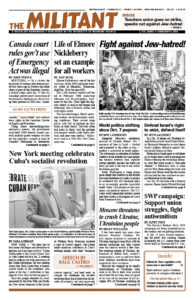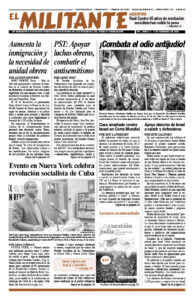LONDON — Some 150,000 teachers, health care workers, bus and train drivers, and other public sector workers stopped work Jan. 18 in the largest union day of action in Northern Ireland in decades. Members of 16 unions picketed and joined marches and rallies in Belfast, Derry and elsewhere.
The work stoppage included action by unions that organize workers in both Northern Ireland and the Republic of Ireland, as well as unions based in the United Kingdom. Workers who prevent ice from forming on roads announced a weeklong strike beginning Jan. 18, and 800 school workers began an eight-day walkout.
Real wages have declined sharply since 2008 throughout the U.K., ravaging workers’ living standards. Wages of public sector workers in Northern Ireland have fallen disproportionately compared to those of their counterparts in England, Scotland and Wales. Many have not received a raise in two years.
Northern Ireland is directly ruled by London. A devolved government was established by the 1998 Belfast Agreement. But it hasn’t functioned since February 2022 when the Democratic Unionist Party walked out of the Northern Ireland Executive. The DUP fears the growing tendency toward ending the British rulers’ division of Ireland, imposed against the wishes of the Irish people over a century ago.
Pay negotiations are now in the hands of the U.K. government. Its Northern Ireland secretary, Christopher Heaton-Harris, says London has allocated a pay offer totaling 584 million pounds ($742 million), but has made the payment conditional on the restoration of the Northern Ireland Executive in an attempt to put pressure on the DUP to return to the government.
Unions have called for decoupling the pay raise from the restoration of the Executive. Their call is backed by Sinn Fein, the largest party in both Northern Ireland and the Irish Republic. It calls for a united Ireland.
Without an end to London’s conditions, further strike action will be inevitable, declared Gerry Murphy of the Irish Congress of Trade Unions.

